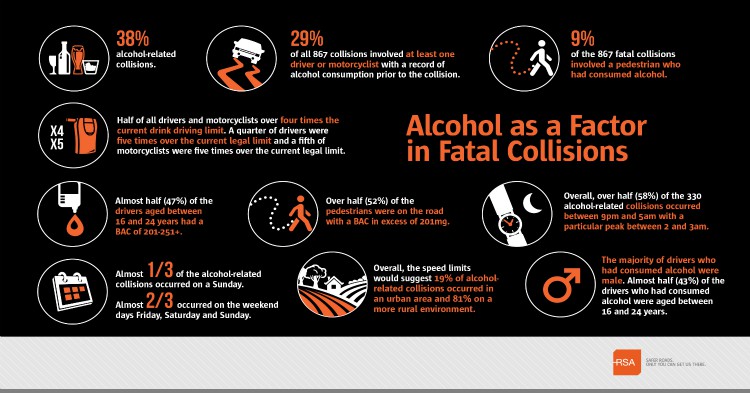A new report from the Road Safety Authority (RSA) has revealed that between 2008 and 2012, alcohol was a contributory factor in 38% of all fatal collisions. The report is the third and largest in a series of landmark reports analysed An Garda Síochána Forensic Fatal Collision Investigation files in order to identify the main contributory factors in collisions.
983 fatal collisions occurred on Irish roads between 2008 and 2012, claiming the lives of 1,077 people. The forensic details of 867 fatal collisions were analysed to identify the cause of the collisions – of these, alcohol was a main contributory factor in 2 in 5 (330) collisions, claiming the lives of 286 people. A further 69 people were seriously injured.
The report also found that of the 867 collisions analysed:
- 38% of all fatal collisions involved a driver, motorcyclist, cyclist or pedestrian who had consumed alcohol
- 29% of all fatal collisions involved a driver or motorcyclist who had consumed alcohol
- 9% of all fatal collisions involved a pedestrian who had consumed alcohol
Of the 947 people killed in the 867 collisions analysed, alcohol was a contributory factor in:
- 38% of all driver deaths
- 30% of all motorcyclist deaths
- 47% of all pedestrian deaths
- 42% of all passenger deaths
- 86% of drivers and 51% of passengers not wearing seatbelt who had consumed alcohol were killed
Of the 330 alcohol related collisions:
- 1 in 10 of all driver alcohol related collisions occurred between 7am and 11am.
Minister for Transport, Tourism and Sport, Shane Ross, TD, said: “This important report highlights that Ireland continues to have a problem with alcohol and road use. The consequences are having a devastating effect in our communities. We must continue educating drivers, pedestrians, cyclists and passengers about the very real dangers and consequences of making the bad decision to use the road after consuming alcohol. This is particularly important as we approach the high risk bank holiday weekend. For some the temptation may be there but I would urge these people to think carefully about the choices they make. We know alcohol promotes risky and potentially life-threatening behaviour – not just among drivers, but among all road users.”
Ms. Moyagh Murdock, Chief Executive of the Road Safety Authority said: “Alcohol has played a significant role in road traffic collisions in Ireland. An RSA report from 2011 showed that alcohol was a confirmed contributory factor in 15% of fatal collisions involving a driver or motorcyclist who had consumed alcohol between 2005 and 2007. The study published today shows that this has risen to 20%. This is deeply worrying. While the majority of people in this country do the right thing, it is shocking to see that alcohol is still a significant factor. It shows that while we all understand in theory that we shouldn’t drink and drive or walk home drunk, we still have not fully eradicated the practice in Ireland, and even more harrowing was the sheer number of young people – young men in particular – who lost their lives on our roads as a result of alcohol.”
Chief Superintendent Aidan Reid, An Garda Síochána said: “Over 3,000 people have been arrested on suspicion of driving under the influence of an intoxicant since the beginning of the year. We wish to remind road-users that An Garda Síochána will be out on the roads over the bank holiday weekend to monitor all high risk behaviour, including drink driving.” He also reminded drivers that “The powers of An Garda Síochána enable us to breath test any driver who has committed a road traffic offence.”
“We want everyone to enjoy the long weekend without fear of meeting a drunk or dangerous driver on the roads. Drink driving is one of the most selfish and dangerous things you can do – not only are you putting your own life at risk, you’re putting other people’s lives at risk. So this weekend, members of An Garda Síochána will be out in force to ensure that those who are taking unnecessary risks are prevented from endangering others,” concluded Chief Superintendent Reid.


